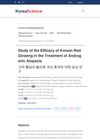Efficacy of Korean Red Ginseng in the Treatment of Alopecia Areata
October 2012
in “
Journal of Ginseng Research
”

TLDR Korean Red Ginseng may help improve hair regrowth when used with corticosteroid injections for Alopecia Areata.
The study, conducted 11 years ago, assessed the effectiveness and safety of Korean Red Ginseng (KRG) in treating Alopecia Areata (AA) by comparing two patient groups: one receiving corticosteroid intra-lesional injection (ILI) alone (Group 2) and the other receiving ILI combined with KRG (Group 1). With 50 patients evenly split between the groups, results after 12 weeks showed no significant differences in hair density and thickness between the groups. However, an expert panel's assessment of global photographs indicated a significant improvement in hair regrowth for the KRG-treated group (Group 1) over the ILI-only group (Group 2), with average scores of 3.6 versus 3.1 (p<0.05). No side effects were noted in the KRG group. The study concluded that KRG could be beneficial as an adjunctive treatment for AA.











